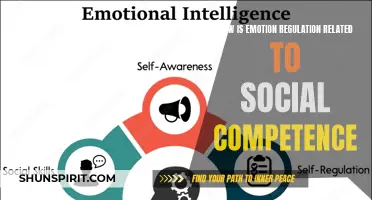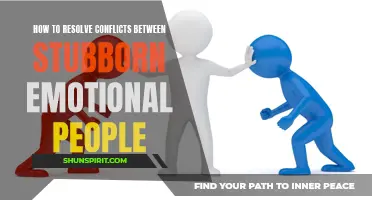
Emotional abuse, a form of psychological manipulation, can often be a silent and hidden suffering, leaving scars on one's soul that aren't easily visible to the outside world. When trapped in an emotionally abusive relationship, the effects can be long-lasting and devastating. But what exactly does it mean to be in an emotionally abusive relationship? Join me on a journey as we explore the intricate depths of emotional abuse and its profound impact on the human psyche.
What You'll Learn
- How can I recognize the signs that I am in an emotionally abusive relationship?
- What steps can I take to protect myself and safely exit an emotionally abusive relationship?
- Are there any resources or hotlines available for individuals in emotionally abusive relationships?
- How can I rebuild my self-esteem and regain confidence after leaving an emotionally abusive relationship?
- Are there any red flags or warning signs I should be aware of when entering a new relationship to prevent becoming involved in another emotionally abusive situation?

How can I recognize the signs that I am in an emotionally abusive relationship?
Emotional abuse is a form of manipulation and control that can leave lasting psychological and emotional scars. It is important to recognize the signs of emotional abuse in order to protect your well-being and seek help if needed. This article will provide a step-by-step guide to help you recognize the signs of emotional abuse in a relationship.
Understand what emotional abuse is:
Emotional abuse includes actions and behaviors aimed at undermining your self-esteem, confidence, and overall well-being. It can involve constant criticism, humiliation, intimidation, control, and manipulation.
Look out for consistent criticism and humiliation:
One of the most common signs of emotional abuse is constant criticism and humiliation. Your partner may belittle your ideas, appearance, or accomplishments, making you feel inadequate or worthless.
Example: Your partner consistently makes negative comments about your appearance, comparing you to other people and making you feel unattractive.
Pay attention to over-control and possessiveness:
Emotionally abusive partners often seek to control and dominate their partners. They may limit your social interactions, insist on knowing all your activities, and make decisions without considering your opinion or feelings.
Example: Your partner constantly monitors your phone calls, texts, and social media activities, demanding to know who you are talking to and where you are at all times.
Notice patterns of manipulation and gaslighting:
Gaslighting is a common tactic used by emotional abusers to make their victims doubt their own reality and sanity. They may distort the truth, deny things they have said or done, and blame you for their abusive behavior.
Example: Your partner repeatedly denies making hurtful comments or dismisses your concerns, making you question your own memory and perception of events.
Be aware of emotional withdrawal and isolation:
Emotionally abusive partners often attempt to isolate their victims from friends, family, and support networks. They may discourage or prevent you from seeing loved ones, leaving you feeling lonely and dependent on them.
Example: Your partner consistently discourages you from spending time with your friends and family, making you feel guilty or selfish for wanting to do so.
Trust your instincts and listen to your emotions:
If something feels off or doesn't sit right with you, trust your instincts. Emotional abuse can often leave you feeling anxious, depressed, or trapped in the relationship. Pay attention to these emotions and take them seriously.
Example: You constantly feel on edge or fearful around your partner, even when they haven't said or done anything explicitly abusive.
Seek support and professional help:
If you suspect you are in an emotionally abusive relationship, it is important to seek support from trusted friends, family members, or professionals, such as therapists or counselors. They can provide validation, guidance, and resources to help you navigate the situation.
Remember, recognizing the signs of emotional abuse is the first step towards healing and finding a healthier relationship. You deserve to be treated with love, respect, and kindness.
Recognizing the Signs of Emotional Abuse from My Father
You may want to see also

What steps can I take to protect myself and safely exit an emotionally abusive relationship?
Dealing with an emotionally abusive relationship can be a difficult and painful experience. Emotional abuse can leave lasting scars and have a detrimental impact on your mental and emotional well-being. If you find yourself in such a relationship and want to protect yourself and safely exit, it is essential to take proactive steps. Here are some crucial steps you can follow:
- Recognize the signs: The first step is to acknowledge and understand that you are in an emotionally abusive relationship. Emotional abuse can manifest in various ways, such as constant criticism, manipulation, humiliation, gaslighting, isolation, and controlling behavior. Educating yourself about the signs of emotional abuse will help you gain clarity and validate your experiences.
- Reach out for support: It is vital to have a support system in place before leaving an abusive relationship. Open up to trusted friends, family members, or support groups who can provide emotional support, guidance, and assistance throughout the process. Sharing your experiences can help you feel validated and strengthen your resolve to leave.
- Create a safety plan: Leaving an abusive relationship can be complex and potentially dangerous. Therefore, it is crucial to develop a safety plan that prioritizes your well-being and minimizes the risk of harm. Include details such as where you will go, whom you will contact for help, and how you will secure important documents and resources. Consider seeking professional help from domestic violence shelters or hotlines to create a comprehensive safety plan.
- Document the abuse: Keeping a record of incidents and evidence of emotional abuse can be valuable, especially if legal action becomes necessary. Documenting dates, times, and specific instances of abuse can help strengthen your case, protect your rights, and ensure your safety during legal proceedings. Additionally, save any threatening messages, emails, or phone recordings as evidence.
- Seek professional help: Emotional abuse can have a severe impact on your mental health. Consider seeking help from a therapist who specializes in trauma or domestic abuse. A therapist can provide guidance, support, and tools to help you heal from the emotional wounds and develop strategies to break free from the abusive cycle.
- Develop an exit plan: Leaving an abusive relationship requires careful planning to ensure your safety. Plan a discreet exit strategy, including when and how you will leave. This may involve finding a safe place to stay, securing transportation, and ensuring you have access to necessary resources such as money, documents, and personal belongings.
- Inform trusted individuals: Share your intentions of leaving with trusted friends, family members, or neighbors. Inform them about your situation and designate a few individuals as emergency contacts who know what is happening and can help monitor your safety during the process. This support network can provide emotional support and assistance if the situation escalates.
- Secure your financial independence: Financial control is a common tactic of emotional abusers. Before leaving, take steps to secure your financial independence. Open a separate bank account in your name, gather important financial documents, and ensure you have access to essential funds. If necessary, seek legal advice to protect your rights and ensure a fair division of assets.
- Exit safely: Leaving an abusive relationship can be dangerous, as the abuser may escalate their behavior. Choose a safe time to leave when the abuser is not present, or when you have a support system in place to ensure your safety. If you fear for your immediate safety, consider seeking help from a local domestic violence shelter or contacting authorities for assistance.
- Prioritize self-care and healing: Ending an emotionally abusive relationship is a significant step towards reclaiming your life and well-being. Focus on self-care and healing as you navigate the process of recovering from the emotional trauma. Engage in activities that bring you joy, practice self-compassion, and consider seeking ongoing therapy to help process the emotions and regain your sense of self-worth.
Remember, leaving an emotionally abusive relationship is a courageous step towards a healthier and happier life. Seek support, take necessary precautions, and prioritize your well-being as you break free from the cycle of abuse. You deserve to be treated with respect, love, and kindness.
Understanding the Timeline for Healing from Emotional Abuse
You may want to see also

Are there any resources or hotlines available for individuals in emotionally abusive relationships?
Emotional abuse can have devastating effects on individuals, causing long-lasting psychological and emotional harm. It is important for individuals in emotionally abusive relationships to seek help and support. Fortunately, there are numerous resources and hotlines available for those who are experiencing emotional abuse.
One valuable resource for individuals in emotionally abusive relationships is the National Domestic Violence Hotline. This hotline provides support, information, and resources to individuals who are experiencing any form of domestic abuse, including emotional abuse. Trained professionals are available 24/7 to listen, provide guidance, and help individuals create safety plans. The National Domestic Violence Hotline can be reached at 1-800-799-SAFE (7233) or through its website.
In addition to hotlines, there are also many organizations and websites dedicated to providing support and resources for individuals in emotionally abusive relationships. One such organization is Loveisrespect.org, which offers a variety of resources including articles, quizzes, and information on healthy relationships. Loveisrespect.org also has a live chat feature, allowing individuals to talk to trained advocates in real-time. Another organization, Break the Cycle, focuses on preventing and ending domestic violence, including emotional abuse. Their website provides resources and information specifically tailored to young people.
It is important to remember that seeking help and support is a courageous step towards ending emotional abuse. However, leaving an emotionally abusive relationship can be complex and challenging. Therefore, it is crucial to have a safety plan in place. A safety plan involves identifying if and when the abuse may escalate, having a plan for escape, and having important documents and resources readily available. Organizations like the National Domestic Violence Hotline can help individuals create a safety plan that fits their specific situation.
In addition to these resources, finding a support system is vital when dealing with emotional abuse. This could include reaching out to friends, family, or support groups who can offer guidance and encouragement throughout the process. Having a strong network of people who believe and support the individual can provide a safe space to discuss experiences and emotions.
It is important to note that emotional abuse is not the fault of the victim, and nobody deserves to be treated in such a way. Seeking help and support is crucial in breaking free from the cycle of abuse and rebuilding a life of safety and happiness. By reaching out to the resources and hotlines available, individuals in emotionally abusive relationships can find the support they need to reclaim their lives.
Overall, there are many resources and hotlines available for individuals who are experiencing emotional abuse. It is crucial to reach out for help and support from organizations like the National Domestic Violence Hotline, Loveisrespect.org, and Break the Cycle. Creating a safety plan and finding a support system is essential in breaking free from emotional abuse and building a life free from harm. Remember, help is available, and nobody should face emotional abuse alone.
Understanding Emotional Child Abuse: Signs and Effects
You may want to see also

How can I rebuild my self-esteem and regain confidence after leaving an emotionally abusive relationship?
Title: Rebuilding Self-Esteem and Regaining Confidence After Leaving an Emotionally Abusive Relationship
Introduction:
Leaving an emotionally abusive relationship takes immense courage and strength. However, the effects of emotional abuse can linger, leaving individuals with diminished self-esteem and confidence. This article aims to provide practical steps to rebuild self-esteem and regain confidence after leaving an emotionally abusive relationship.
Seek Support:
Reaching out to supportive friends, family members, or professionals is crucial for healing. Sharing your experiences and emotions with those who validate and understand your struggles can help rebuild your self-esteem. Support groups, therapy, or counseling can provide a safe space to work through the residual effects of the abuse.
Practice Self-Compassion:
Self-compassion involves treating yourself with kindness, understanding, and patience. Acknowledge that the emotional abuse was not your fault and that you deserve to be treated with love and respect. Replace self-critical thoughts with self-affirming ones and engage in activities that nourish your well-being.
Identify and Challenge Negative Beliefs:
Emotional abuse often manipulates victims into believing they are unworthy or at fault. Identify these negative beliefs and challenge them with evidence to the contrary. For example, if you believe you are unlovable, reassess past relationships, friendships, or accomplishments that demonstrate the opposite.
Set Healthy Boundaries:
Relearning how to set boundaries is essential after experiencing emotional abuse. Practice recognizing and expressing your needs, wants, and limits to others. Start with small situations and gradually build up to more significant challenges. Understand that it's okay to say "no" and prioritize your well-being.
Engage in Self-Care:
Prioritize self-care activities that promote self-esteem and confidence. Engaging in exercise, practicing mindfulness techniques, pursuing hobbies, and surrounding yourself with positive influences can help rebuild your sense of self-worth. Make a conscious effort to invest in yourself and prioritize your needs.
Celebrate Small Victories:
Rebuilding self-esteem is an ongoing process. Celebrate each small victory along the way, no matter how insignificant it may seem initially. Recognize and validate your progress, as each step forward brings you closer to regaining confidence and a healthier self-image.
Focus on Personal Growth:
Redirect your energy towards personal growth and self-improvement. Set goals, whether personal or professional, and develop a plan to achieve them. This process can help rebuild confidence by emphasizing your abilities, strengths, and potential.
Rebuilding self-esteem and regaining confidence after leaving an emotionally abusive relationship is a journey that requires time, patience, and the willingness to heal. Remember that you are deserving of love, respect, and happiness. By seeking support, practicing self-compassion, challenging negative beliefs, setting healthy boundaries, engaging in self-care, celebrating small victories, and focusing on personal growth, you can gradually restore your sense of self-worth and rebuild a fulfilling life. Seek professional help if necessary, as trained therapists can provide valuable guidance and support during this healing process.
The Emotional Abuse Behind Ignoring Someone: Exploring the Effects and Consequences
You may want to see also

Are there any red flags or warning signs I should be aware of when entering a new relationship to prevent becoming involved in another emotionally abusive situation?
Entering a new relationship can be an exciting time filled with hope and anticipation. However, it's important to be mindful of any potential red flags or warning signs that may indicate the potential for emotional abuse. Emotional abuse can have long-lasting and damaging effects on individuals, so it's essential to take steps to protect yourself from entering into another abusive situation. Here are some red flags and warning signs to be aware of:
- Controlling behavior: One of the most common red flags in an emotionally abusive relationship is the presence of controlling behavior. This can manifest in various ways, such as your partner trying to control who you spend time with, where you go, or what you wear. They may also constantly check in on you, invade your privacy, or make decisions for you without your input. These actions are clear signs of a potential abuser and should be taken seriously.
- Jealousy and possessiveness: Another warning sign of emotional abuse is excessive jealousy and possessiveness. While it is normal for partners to feel some level of jealousy, it becomes problematic when it turns into possessiveness and restricts your freedom. If your partner becomes overly jealous of your interactions with others, accuses you of infidelity without evidence, or constantly demands to know your whereabouts, this may indicate an unhealthy level of control.
- Gaslighting: Gaslighting is a manipulative tactic used by abusers to make their victims doubt their own reality. They may deny or twist events, lie about past occurrences, or make you feel like you're going crazy. Gaslighting can have a severe impact on your self-esteem and mental well-being. If your partner consistently undermines your perception of reality or makes you doubt your own memory, it's essential to recognize this as a warning sign of emotional abuse.
- Constant criticism and belittlement: Emotional abusers often engage in a pattern of constant criticism and belittlement to erode your self-confidence and self-worth. They may nitpick your appearance, intelligence, or abilities, and make hurtful comments disguised as jokes or constructive criticism. If your partner regularly puts you down, insults you, or makes you feel inadequate, it is not a healthy dynamic. This type of behavior is meant to diminish your sense of self and make you reliant on them for validation.
- Isolation from friends and family: Abusers frequently try to isolate their victims from friends and family members as a means of gaining further control over them. They may discourage you from spending time with loved ones, create conflicts in relationships, or act possessive towards your social support system. Isolation is a potent tool that allows the abuser to maintain control over their victim, making it harder for them to seek help or leave the relationship.
It is crucial to acknowledge these warning signs and trust your instincts when entering a new relationship. If you notice any red flags or feel uneasy about the dynamics of the relationship, it's important to take steps to protect yourself:
- Communicate openly: Share your concerns and boundaries with your partner early on. It's important to establish clear communication from the beginning and let your partner know what behaviors are unacceptable to you.
- Set and maintain boundaries: Establishing and enforcing personal boundaries is essential in any relationship. Ensure that your partner respects your boundaries and does not cross them. Red flags should be taken as serious violations of your boundaries and should prompt a reevaluation of the relationship.
- Seek support: Reach out to trusted friends, family, or a counselor for support and advice. A support system can help provide validation and an outside perspective on the relationship, which can be valuable in identifying red flags.
- Educate yourself: Read books or attend workshops on healthy relationships and emotional abuse. Understanding what constitutes a healthy relationship and the warning signs of abuse is crucial in protecting yourself from becoming involved in another emotionally abusive situation.
- Trust your instincts: Your intuition is a powerful tool. If something feels off, listen to your gut. Don't dismiss your worries or doubts.
Remember, emotional abuse is never your fault, and you deserve to be in a loving and respectful relationship. By being aware of the warning signs and taking proactive steps to protect yourself, you can greatly reduce the likelihood of becoming involved in another emotionally abusive situation.
Signs That Indicate My Boyfriend Might Be Emotionally Abusive
You may want to see also
Frequently asked questions
There are several signs that you may be in an emotionally abusive relationship. These can include constant criticism or belittling, manipulation, control and jealousy, isolation from friends and family, emotional blackmail, and guilt-tripping. If you constantly feel scared, hopeless, or worthless because of your partner's behavior, it is likely that you are in an emotionally abusive relationship.
If you find yourself in an emotionally abusive relationship, it is important to prioritize your safety and well-being. Consider reaching out to a trusted friend or family member for support. You may also want to seek help from a therapist or counselor who specializes in relationship issues. It can be helpful to create a safety plan and consider leaving the relationship if you believe it is the best choice for your mental and emotional health.
While it is possible for some relationships to recover from emotional abuse with the help of therapy and genuine efforts of both parties to make positive changes, it is important to recognize that this is not always the case. It is not your responsibility to fix the abusive behavior of your partner, and it is crucial to prioritize your own well-being. In some cases, ending the relationship may be the healthiest option. Make sure to consult with a professional who can provide guidance and support tailored to your specific situation.







